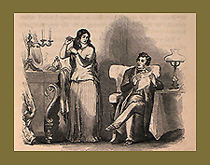



The Shelby plantation house, with its "easy, and even opulent circumstances" is an ambiguous place. Although Mr. Shelby calls himself "a humane man" and his wife claims to have always believed slavery wrong, their home (by virtue of its being within the borders of the state of Kentucky, where kindness and cruelty are so painfully mingled in the institution of slavery) is overhung with "the shadow of law;"
"So long as the law considers all these human beings, with beating hearts and living affections, only as so many things belonging to a master, -- so long as the failure, or misfortune, or imprudence, or death of the kindest owner, may cause them any day to exchange a life of kind protection and indulgence for one of hopeless misery and toil, -- so long it is impossible to make anything beautiful or desirable in the best regulated administration of slavery."If the metaphor of war is applied to slavery, the Shelby home is very much an active front. Although ultimately the forces of good prevail, the battle is hard won -- with, among other hardships, the death of Uncle Tom.
 The "battle" is fought in each room of the house and beyond. Mr. Haley
and his slave trade have attained their place in the parlor and dining
room (to the chagrin of Mrs. Shelby -- "By the by, Arthur, who was that
low-bred fellow that you lugged in to our dinner table to-day?") In the
apartment of Mr. and Mrs. Shelby, slavery and economic necessity win out
over Christianity and humanity. The triumph, however, is far from complete.
The "battle" is fought in each room of the house and beyond. Mr. Haley
and his slave trade have attained their place in the parlor and dining
room (to the chagrin of Mrs. Shelby -- "By the by, Arthur, who was that
low-bred fellow that you lugged in to our dinner table to-day?") In the
apartment of Mr. and Mrs. Shelby, slavery and economic necessity win out
over Christianity and humanity. The triumph, however, is far from complete.
The kitchen, if it does not belong to Aunt Chloe, at least falls within her jurisdiction. There she can show her expertise as a cook, which is superior not only to her counterparts on other plantations, but also to her white Mistress. In "her" kitchen Chloe can exert an influence over what takes place on the plantation. Her power is best illustrated in the delay of dinner she effectuates, which slows Haley's pursuit of Eliza, "Though Mrs. Shelby had promised that the dinner should be hurried on table, yet it was soon seen...that it required more than one to make a bargain. So, although the order was fairly given out in Haley's hearing, and carried to Aunt Chloe by at least half a dozen juvenile messengers, that dignitary only gave certain very gruff snorts, and tosses of her head, and went on with every operation in an unusually leisurely and circumstantial manner." Although Chloe behaves with the implicit approbation of her mistress, it is she who "'warn't a going to have raw gravy on the table, to help nobody's catchings'"
When, after distracting Haley in his pursuit of Eliza, Sam is rewarded by his mistress with an order to go to Chloe for "some of that cold ham that was left of dinner to-day," he decides that it is in his best interest to be warm to Chloe, "for he well knew that although 'Missis' orders' would undoubtedly by followed to the letter, yet he should gain a considerable deal by enlisting the spirit also." It is in Chloe's power to give nourishment and, as given in another kitchen, motherly beneficence; "if he [Sam] had been the prodigal son himself he could not have been overwhelmed with more maternal bountifulness."

As mentioned above, the Shelby plantation is perhaps most interesting
as a battleground in the war between slavery and Christian equality. The
evenings young George Shelby spends in Uncle Tom and Aunt Chloe's cabin
attest to the congenial, though unequal, relationships between blacks and
whites. An understanding of the Shelby place must incorporate an examination
of the most important building on the estate: